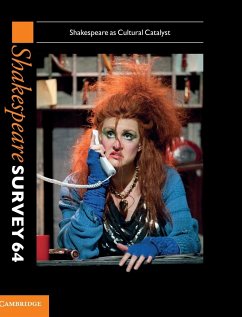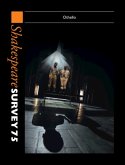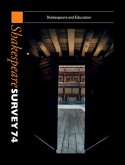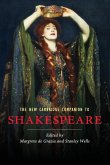Shakespeare Survey
Herausgeber: Holland, Peter
Shakespeare Survey
Herausgeber: Holland, Peter
- Gebundenes Buch
- Merkliste
- Auf die Merkliste
- Bewerten Bewerten
- Teilen
- Produkt teilen
- Produkterinnerung
- Produkterinnerung
The theme for Shakespeare Survey 64 is 'Shakespeare as Cultural Catalyst'.
Andere Kunden interessierten sich auch für
![Shakespeare Survey 77 Shakespeare Survey 77]() Shakespeare Survey 77116,99 €
Shakespeare Survey 77116,99 €![Shakespeare Survey 76 Shakespeare Survey 76]() Shakespeare Survey 76138,99 €
Shakespeare Survey 76138,99 €![Shakespeare Survey 75 Shakespeare Survey 75]() Shakespeare Survey 75133,99 €
Shakespeare Survey 75133,99 €![Shakespeare Survey 74 Shakespeare Survey 74]() Shakespeare Survey 74139,99 €
Shakespeare Survey 74139,99 €![Shakespeare Survey 74 Shakespeare Survey 74]() Shakespeare Survey 7458,99 €
Shakespeare Survey 7458,99 €![The New Cambridge Companion to Shakespeare The New Cambridge Companion to Shakespeare]() The New Cambridge Companion to Shakespeare26,99 €
The New Cambridge Companion to Shakespeare26,99 €![Shakespeare and British World War Two Film Shakespeare and British World War Two Film]() Sullivan, Jr, Garrett A. (Pennsylvania State University)Shakespeare and British World War Two Film34,99 €
Sullivan, Jr, Garrett A. (Pennsylvania State University)Shakespeare and British World War Two Film34,99 €-
-
-
The theme for Shakespeare Survey 64 is 'Shakespeare as Cultural Catalyst'.
Hinweis: Dieser Artikel kann nur an eine deutsche Lieferadresse ausgeliefert werden.
Hinweis: Dieser Artikel kann nur an eine deutsche Lieferadresse ausgeliefert werden.
Produktdetails
- Produktdetails
- Shakespeare Survey
- Verlag: Cambridge University Press
- Seitenzahl: 466
- Erscheinungstermin: 6. Oktober 2011
- Englisch
- Abmessung: 260mm x 208mm x 29mm
- Gewicht: 1074g
- ISBN-13: 9781107011229
- ISBN-10: 1107011221
- Artikelnr.: 33563024
- Herstellerkennzeichnung
- Libri GmbH
- Europaallee 1
- 36244 Bad Hersfeld
- gpsr@libri.de
- Shakespeare Survey
- Verlag: Cambridge University Press
- Seitenzahl: 466
- Erscheinungstermin: 6. Oktober 2011
- Englisch
- Abmessung: 260mm x 208mm x 29mm
- Gewicht: 1074g
- ISBN-13: 9781107011229
- ISBN-10: 1107011221
- Artikelnr.: 33563024
- Herstellerkennzeichnung
- Libri GmbH
- Europaallee 1
- 36244 Bad Hersfeld
- gpsr@libri.de
1. The commercial bard: business models for the 21st century Kathleen
McLuskie; 2. International innovation? Shakespeare as intercultural
catalyst Emily Linnemann; 3. Brand Shakespeare? Kate Rumbold; 4. Global
Shakespeare 2.0 and the task of the performance archive Alex Huang; 5. An
international database of Shakespeare on film, television and radio Olwen
Terris; 6. 'Sounds and sweet airs': music in Shakespearean performance
history David Lindley; 7. Using Shakespeare with memes, remixes, and fanfic
Fran Teague; 8. 'Pretty much how the internet works', or, aiding and
abetting the deprofessionalization of Shakespeare studies Sharon O'Dair; 9.
Catalyzing what?: Remediation, history, and what of Love's Labour's lasts
Diana Henderson; 10. Kabuki Twelfth Night and Kyogen Richard III:
Shakespeare as a cultural catalyst Shoichiro Kawai; 11. The Sonnets as an
open-source initiative Julie Sanders; 12. 'A stage of the mind': Hamlet on
post-war British radio Susanne Greenhalgh; 13. Post-textual Shakespeare
Douglas M. Lanier; 14. I am what I am not: identifying with the Other in
Othello Stephen Cohen; 15. Desdemona's book, lost and found Roshni
Mooneeram; 16. Non-catalyst and marginal Shakespeares in the
nineteenth-century revival of Catalan-speaking cultures Jesús Tronch-Pérez;
17. Shakespeare, Mácha and Czech romantic historicism Martin Procházka; 18.
An Irish catalysis: W. B. Yeats and the uses of Shakespeare Andrew Murphy;
19. François-Victor Hugo and the limits of cultural catalysis Ruth Morse;
20. 'You taught me language': Shakespeare in India Poonam Trivedi; 21.
There is some soul of good: an action-centred approach to teaching
Shakespeare in schools Jonothan Neelands and Jacqui O'Hanlon; 22. The Royal
Shakespeare Company as 'cultural chemist' Sarah Olive; 23. Shakespeare at
the white greyhound Adam Hooks; 24. Dark matter: Shakespeare's foul dens
and forests Charlotte Scott; 25. What we hear, what we see: theatre for a
new audience's 2009 Hamlet Bernice W. Kliman; 26. Narrative of negativity:
Whig historiography and the spectre of King James in Measure for Measure
Kevin Quarmby; 27. Québécois Shakespeare goes global: Robert Lepage's
Coriolan Robert Ormsby; 28. Endless mornings on endless faces: Shakespeare
and Philip Larkin Peter Holbrook; 29. Shakespeare performances in England
2010 Carol Chillington Rutter; 30. Professional Shakespeare productions in
the British Isles, January-December 2009 James Shaw; 31. The year's
contribution to Shakespeare studies: a. Critical studies reviewed by Julie
Sanders; b. Shakespeare in performance reviewed by Pascale Aebischer; c.
Editions and textual studies reviewed by Eric Rasmussen.
McLuskie; 2. International innovation? Shakespeare as intercultural
catalyst Emily Linnemann; 3. Brand Shakespeare? Kate Rumbold; 4. Global
Shakespeare 2.0 and the task of the performance archive Alex Huang; 5. An
international database of Shakespeare on film, television and radio Olwen
Terris; 6. 'Sounds and sweet airs': music in Shakespearean performance
history David Lindley; 7. Using Shakespeare with memes, remixes, and fanfic
Fran Teague; 8. 'Pretty much how the internet works', or, aiding and
abetting the deprofessionalization of Shakespeare studies Sharon O'Dair; 9.
Catalyzing what?: Remediation, history, and what of Love's Labour's lasts
Diana Henderson; 10. Kabuki Twelfth Night and Kyogen Richard III:
Shakespeare as a cultural catalyst Shoichiro Kawai; 11. The Sonnets as an
open-source initiative Julie Sanders; 12. 'A stage of the mind': Hamlet on
post-war British radio Susanne Greenhalgh; 13. Post-textual Shakespeare
Douglas M. Lanier; 14. I am what I am not: identifying with the Other in
Othello Stephen Cohen; 15. Desdemona's book, lost and found Roshni
Mooneeram; 16. Non-catalyst and marginal Shakespeares in the
nineteenth-century revival of Catalan-speaking cultures Jesús Tronch-Pérez;
17. Shakespeare, Mácha and Czech romantic historicism Martin Procházka; 18.
An Irish catalysis: W. B. Yeats and the uses of Shakespeare Andrew Murphy;
19. François-Victor Hugo and the limits of cultural catalysis Ruth Morse;
20. 'You taught me language': Shakespeare in India Poonam Trivedi; 21.
There is some soul of good: an action-centred approach to teaching
Shakespeare in schools Jonothan Neelands and Jacqui O'Hanlon; 22. The Royal
Shakespeare Company as 'cultural chemist' Sarah Olive; 23. Shakespeare at
the white greyhound Adam Hooks; 24. Dark matter: Shakespeare's foul dens
and forests Charlotte Scott; 25. What we hear, what we see: theatre for a
new audience's 2009 Hamlet Bernice W. Kliman; 26. Narrative of negativity:
Whig historiography and the spectre of King James in Measure for Measure
Kevin Quarmby; 27. Québécois Shakespeare goes global: Robert Lepage's
Coriolan Robert Ormsby; 28. Endless mornings on endless faces: Shakespeare
and Philip Larkin Peter Holbrook; 29. Shakespeare performances in England
2010 Carol Chillington Rutter; 30. Professional Shakespeare productions in
the British Isles, January-December 2009 James Shaw; 31. The year's
contribution to Shakespeare studies: a. Critical studies reviewed by Julie
Sanders; b. Shakespeare in performance reviewed by Pascale Aebischer; c.
Editions and textual studies reviewed by Eric Rasmussen.
1. The commercial bard: business models for the 21st century Kathleen
McLuskie; 2. International innovation? Shakespeare as intercultural
catalyst Emily Linnemann; 3. Brand Shakespeare? Kate Rumbold; 4. Global
Shakespeare 2.0 and the task of the performance archive Alex Huang; 5. An
international database of Shakespeare on film, television and radio Olwen
Terris; 6. 'Sounds and sweet airs': music in Shakespearean performance
history David Lindley; 7. Using Shakespeare with memes, remixes, and fanfic
Fran Teague; 8. 'Pretty much how the internet works', or, aiding and
abetting the deprofessionalization of Shakespeare studies Sharon O'Dair; 9.
Catalyzing what?: Remediation, history, and what of Love's Labour's lasts
Diana Henderson; 10. Kabuki Twelfth Night and Kyogen Richard III:
Shakespeare as a cultural catalyst Shoichiro Kawai; 11. The Sonnets as an
open-source initiative Julie Sanders; 12. 'A stage of the mind': Hamlet on
post-war British radio Susanne Greenhalgh; 13. Post-textual Shakespeare
Douglas M. Lanier; 14. I am what I am not: identifying with the Other in
Othello Stephen Cohen; 15. Desdemona's book, lost and found Roshni
Mooneeram; 16. Non-catalyst and marginal Shakespeares in the
nineteenth-century revival of Catalan-speaking cultures Jesús Tronch-Pérez;
17. Shakespeare, Mácha and Czech romantic historicism Martin Procházka; 18.
An Irish catalysis: W. B. Yeats and the uses of Shakespeare Andrew Murphy;
19. François-Victor Hugo and the limits of cultural catalysis Ruth Morse;
20. 'You taught me language': Shakespeare in India Poonam Trivedi; 21.
There is some soul of good: an action-centred approach to teaching
Shakespeare in schools Jonothan Neelands and Jacqui O'Hanlon; 22. The Royal
Shakespeare Company as 'cultural chemist' Sarah Olive; 23. Shakespeare at
the white greyhound Adam Hooks; 24. Dark matter: Shakespeare's foul dens
and forests Charlotte Scott; 25. What we hear, what we see: theatre for a
new audience's 2009 Hamlet Bernice W. Kliman; 26. Narrative of negativity:
Whig historiography and the spectre of King James in Measure for Measure
Kevin Quarmby; 27. Québécois Shakespeare goes global: Robert Lepage's
Coriolan Robert Ormsby; 28. Endless mornings on endless faces: Shakespeare
and Philip Larkin Peter Holbrook; 29. Shakespeare performances in England
2010 Carol Chillington Rutter; 30. Professional Shakespeare productions in
the British Isles, January-December 2009 James Shaw; 31. The year's
contribution to Shakespeare studies: a. Critical studies reviewed by Julie
Sanders; b. Shakespeare in performance reviewed by Pascale Aebischer; c.
Editions and textual studies reviewed by Eric Rasmussen.
McLuskie; 2. International innovation? Shakespeare as intercultural
catalyst Emily Linnemann; 3. Brand Shakespeare? Kate Rumbold; 4. Global
Shakespeare 2.0 and the task of the performance archive Alex Huang; 5. An
international database of Shakespeare on film, television and radio Olwen
Terris; 6. 'Sounds and sweet airs': music in Shakespearean performance
history David Lindley; 7. Using Shakespeare with memes, remixes, and fanfic
Fran Teague; 8. 'Pretty much how the internet works', or, aiding and
abetting the deprofessionalization of Shakespeare studies Sharon O'Dair; 9.
Catalyzing what?: Remediation, history, and what of Love's Labour's lasts
Diana Henderson; 10. Kabuki Twelfth Night and Kyogen Richard III:
Shakespeare as a cultural catalyst Shoichiro Kawai; 11. The Sonnets as an
open-source initiative Julie Sanders; 12. 'A stage of the mind': Hamlet on
post-war British radio Susanne Greenhalgh; 13. Post-textual Shakespeare
Douglas M. Lanier; 14. I am what I am not: identifying with the Other in
Othello Stephen Cohen; 15. Desdemona's book, lost and found Roshni
Mooneeram; 16. Non-catalyst and marginal Shakespeares in the
nineteenth-century revival of Catalan-speaking cultures Jesús Tronch-Pérez;
17. Shakespeare, Mácha and Czech romantic historicism Martin Procházka; 18.
An Irish catalysis: W. B. Yeats and the uses of Shakespeare Andrew Murphy;
19. François-Victor Hugo and the limits of cultural catalysis Ruth Morse;
20. 'You taught me language': Shakespeare in India Poonam Trivedi; 21.
There is some soul of good: an action-centred approach to teaching
Shakespeare in schools Jonothan Neelands and Jacqui O'Hanlon; 22. The Royal
Shakespeare Company as 'cultural chemist' Sarah Olive; 23. Shakespeare at
the white greyhound Adam Hooks; 24. Dark matter: Shakespeare's foul dens
and forests Charlotte Scott; 25. What we hear, what we see: theatre for a
new audience's 2009 Hamlet Bernice W. Kliman; 26. Narrative of negativity:
Whig historiography and the spectre of King James in Measure for Measure
Kevin Quarmby; 27. Québécois Shakespeare goes global: Robert Lepage's
Coriolan Robert Ormsby; 28. Endless mornings on endless faces: Shakespeare
and Philip Larkin Peter Holbrook; 29. Shakespeare performances in England
2010 Carol Chillington Rutter; 30. Professional Shakespeare productions in
the British Isles, January-December 2009 James Shaw; 31. The year's
contribution to Shakespeare studies: a. Critical studies reviewed by Julie
Sanders; b. Shakespeare in performance reviewed by Pascale Aebischer; c.
Editions and textual studies reviewed by Eric Rasmussen.








